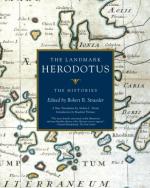|
This section contains 5,488 words (approx. 19 pages at 300 words per page) |

|
SOURCE: "Philosophy of Herodotus," in Blackwood's Edinburgh Magazine, Vol. LI, No. CCCXV, January, 1842, pp. 1-21.
An English critic and essayist, De Quincey used his own life as the subject of his best-known work, Confessions of an English Opium Eater (1822), in which he chronicled his addiction to opium. He contributed reviews to a number of London journals and earned a reputation as an insightful if occasionally longwinded literary critic. At the time of De Quincey's death, his critical expertise was underestimated, though his talent as a prose writer had long been acknowledged. In the twentieth century, some critics still disdain the digressive qualities of De Quincey's writing, yet others find that his essays display an acute psychological awareness. In the following excerpt, De Quincey tries to rectify what he sees as a false and narrow view of Herodotus. He argues that Herodotus is much more than a historian and...
|
This section contains 5,488 words (approx. 19 pages at 300 words per page) |

|


